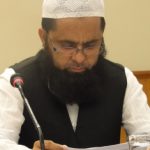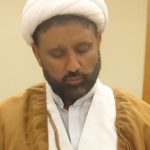Religious scholars and religious-political parties will have to work for improvement in the current political system of Pakistan while staying within the country’s constitutional framework and system of government. Any system of government that is not based on social justice and fairness is opposed to one espoused in Islam. Islam does not support a single governmental system. Nor can one system be implemented everywhere in the world. However Islam has provided some overarching principles for governing or ruling a state that are based on a system of rights and obligations.
These views were expressed by Pakistan’s leading religious scholars belonging to various schools of thought who participated in a seminar on “Democracy and constitution of Pakistan: viewpoints of religious scholars,” organized by Pak Institute for Peace Studies in Karachi on May 17, 2014.
 Chairman Central Ruet-e-Hilal Committee and President Tanzeemul Madaris Pakistan Mufti Muneebur Rehman said there are a number of contradictions and ambiguities in Pakistan’s constitution such as those inherent in the articles 62 and 63, which were extensively debated during the process of scrutiny of candidates for the 2013 election. He talked about establishing a monitoring committee to ensure transparency and accountability in governance. He was of the view that Islam allows formulation of legislation that contributes towards welfare of human beings and establishing order in the society but with the condition that the laws thus formed are not contradictory to the Holy Quran and Sunnah.
Chairman Central Ruet-e-Hilal Committee and President Tanzeemul Madaris Pakistan Mufti Muneebur Rehman said there are a number of contradictions and ambiguities in Pakistan’s constitution such as those inherent in the articles 62 and 63, which were extensively debated during the process of scrutiny of candidates for the 2013 election. He talked about establishing a monitoring committee to ensure transparency and accountability in governance. He was of the view that Islam allows formulation of legislation that contributes towards welfare of human beings and establishing order in the society but with the condition that the laws thus formed are not contradictory to the Holy Quran and Sunnah.
 Director PIPS Mohammad Amir Rana highlighted the importance of academic and legal debate on democracy and constitution of Pakistan. He said extremist and militant elements are using their interpretation of certain precepts of Islam to sow ambiguities in people’s minds about democracy and Pakistan’s constitution. Religious scholars should come forward to debate and help people understand these issues properly, he stated.
Director PIPS Mohammad Amir Rana highlighted the importance of academic and legal debate on democracy and constitution of Pakistan. He said extremist and militant elements are using their interpretation of certain precepts of Islam to sow ambiguities in people’s minds about democracy and Pakistan’s constitution. Religious scholars should come forward to debate and help people understand these issues properly, he stated.
 Principal Jamia Sattaria, Karachi Maulana Mohammad Salfi stated the most important task before us is to figure out how to implement the constitution in its true letter and spirit, particularly the section that describes fundamental rights of the people.
Principal Jamia Sattaria, Karachi Maulana Mohammad Salfi stated the most important task before us is to figure out how to implement the constitution in its true letter and spirit, particularly the section that describes fundamental rights of the people.
 Dean Islamic Studies Department at the University of Karachi Dr. Shakeel Auj said although Pakistan’s constitution does not allow any un-Islamic legislation but this provision was mostly used to debate only unimportant issues. Confrontation on the basis of personal liking and disliking damages the religion, he maintained.
Dean Islamic Studies Department at the University of Karachi Dr. Shakeel Auj said although Pakistan’s constitution does not allow any un-Islamic legislation but this provision was mostly used to debate only unimportant issues. Confrontation on the basis of personal liking and disliking damages the religion, he maintained.
 A columnist and religious scholar Maulana Mohammad Shafi Chitraali said Islam is system of living while democracy is a system of government and one of the ways to achieve a peaceful system of ruling. If democracy is related to solving problems with consultation and collective intelligence, then it is very much relevant to Islam.
A columnist and religious scholar Maulana Mohammad Shafi Chitraali said Islam is system of living while democracy is a system of government and one of the ways to achieve a peaceful system of ruling. If democracy is related to solving problems with consultation and collective intelligence, then it is very much relevant to Islam.
 Vice Principal Jamiaul Sadiq, Quetta, Allama Akbar Hussain Zahidi said that religious scholars from all school of thoughts had played their role in formulating the constitution. He said there is no doubt that democracy is among the best forms of government but sadly we have implemented it only partially.
Vice Principal Jamiaul Sadiq, Quetta, Allama Akbar Hussain Zahidi said that religious scholars from all school of thoughts had played their role in formulating the constitution. He said there is no doubt that democracy is among the best forms of government but sadly we have implemented it only partially.
 Maulana Saifullah Rabbani from Jamia Banoria stated that as we have connected democracy in Pakistan with Islamic principles of governance, those who claim that it is un-Islamic are doing injustice.
Maulana Saifullah Rabbani from Jamia Banoria stated that as we have connected democracy in Pakistan with Islamic principles of governance, those who claim that it is un-Islamic are doing injustice.
 Leader of Jamaat-e-Islami Balochistan and Advisor to Federal Shariah Court Maulana Abdul Haq Hashmi stated that the word “jamhoor” is used in Islamic teachings to describe opinion of the masses as in democracy. Therefore we do not need improvements in Islam but we need to improve the democracy in our country and elect such individuals and groups that can bring change through good governance.
Leader of Jamaat-e-Islami Balochistan and Advisor to Federal Shariah Court Maulana Abdul Haq Hashmi stated that the word “jamhoor” is used in Islamic teachings to describe opinion of the masses as in democracy. Therefore we do not need improvements in Islam but we need to improve the democracy in our country and elect such individuals and groups that can bring change through good governance.
 Professor and Mufti Jamia Uloom Karachi Dr. Ejaz Ahmad Samdani said Islam and Shariah allow for formulation of legislation based on social and political environment like we see in the examples of all four caliphs who chose different electoral processes. He said that the role of the masses in policy formulation is vital under Islamic principles; women are also to be consulted in the formation and implementation of laws linked to their rights and affairs.
Professor and Mufti Jamia Uloom Karachi Dr. Ejaz Ahmad Samdani said Islam and Shariah allow for formulation of legislation based on social and political environment like we see in the examples of all four caliphs who chose different electoral processes. He said that the role of the masses in policy formulation is vital under Islamic principles; women are also to be consulted in the formation and implementation of laws linked to their rights and affairs.
 Professor Syed Ahmed Banori of Jamia Uloom Islamia Allama Mohammad Yousaf Banori Town stated that a lot of work on Islamic form of state and government has been done in the past century, yet we cannot come up with a conclusion. Religious scholars will have to give their honest and clear opinions on it.
Professor Syed Ahmed Banori of Jamia Uloom Islamia Allama Mohammad Yousaf Banori Town stated that a lot of work on Islamic form of state and government has been done in the past century, yet we cannot come up with a conclusion. Religious scholars will have to give their honest and clear opinions on it.
 Director Al Safa Academy Professor Mirza Amir Baig said that the ruler has the right to give his final opinion on legislation, meanwhile according to Islamic principles nobody has the right to recommend himself/herself as ruler of the state.
Director Al Safa Academy Professor Mirza Amir Baig said that the ruler has the right to give his final opinion on legislation, meanwhile according to Islamic principles nobody has the right to recommend himself/herself as ruler of the state.
 Director Al Safa Academy Professor Mirza Amir Baig said that the ruler has the right to give his final opinion on legislation, meanwhile according to Islamic principles nobody has the right to recommend himself/herself as ruler of the state.
Director Al Safa Academy Professor Mirza Amir Baig said that the ruler has the right to give his final opinion on legislation, meanwhile according to Islamic principles nobody has the right to recommend himself/herself as ruler of the state.
 Chairman Jamiaul Nisar Karachi Maulana Kashif Sheikh said Islamic principles of governance are very clear; western democracies are also based on these principles. From the right to vote to rights of women, Islam had clarified them many centuries ago.
Chairman Jamiaul Nisar Karachi Maulana Kashif Sheikh said Islamic principles of governance are very clear; western democracies are also based on these principles. From the right to vote to rights of women, Islam had clarified them many centuries ago.
 Research scholar Al Zahir Academy Maulana Ejaz Haider Mazahiri said it is vital for a leader to be popular among the masses.
Research scholar Al Zahir Academy Maulana Ejaz Haider Mazahiri said it is vital for a leader to be popular among the masses.
 Secretary General Jamiat-e-Ulema-e-Pakistan Syed Aqeel Anjum Qadri said it is the responsibility of religious political organizations to remove the ambiguities among people regarding democracy.
Secretary General Jamiat-e-Ulema-e-Pakistan Syed Aqeel Anjum Qadri said it is the responsibility of religious political organizations to remove the ambiguities among people regarding democracy.

